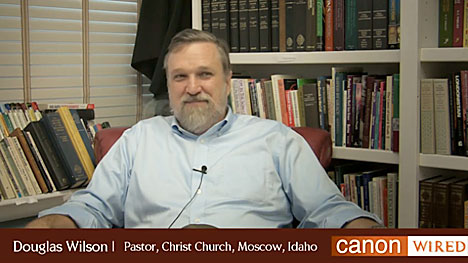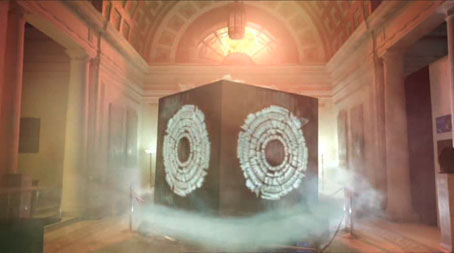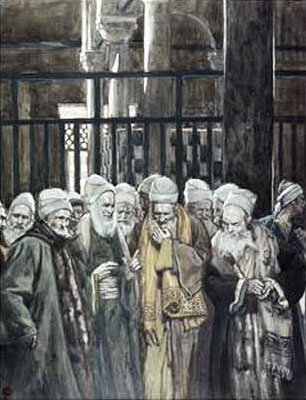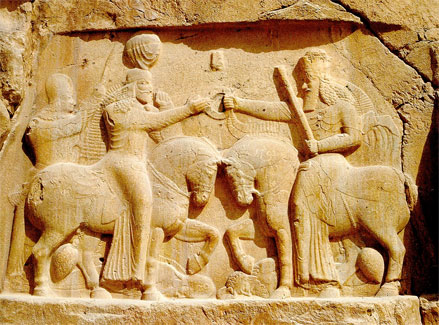Sep
6
2010

The Restoration era Scriptures are the most misunderstood texts in the Bible. Our failure to recognise their recapitulation of patterns from the Torah — and the fact that they are not presented in chronological order but by genre — makes it hard for us to put the pieces together. [1] Very often, we miss great ironies because we don’t get the joke.
Continue reading
1 comment | tags: Covenant Theology, Daniel, Ezekiel, Jeremiah, Joke, Nebuchadnezzar, Zedekiah | posted in Biblical Theology, The Restoration Era
Sep
3
2010
or Insanity and Spiritual Songs

Van Gogh’s work has been regarded by some as “hallucinatory,” however his letters show that few artists were as intelligent and rational. His work was not the product of his dark times but of his struggle against them.
“I am feeling well just now… I am not strictly speaking mad, for my mind is absolutely normal in the intervals, and even more so than before. But during the attacks it is terrible—and then I lose consciousness of everything. But that spurs me on to work and to seriousness, as a miner who is always in danger and makes haste in what he does.” [1]
Continue reading
Comments Off | tags: Covenant Theology, Evolution, Hebrews, Jeremiah, John Piper, Martyrdom, Mission, Noah, Paul, Persecution, Poetry, Psalms, Ray Sutton, Van Gogh, Vindication | posted in Bible Matrix, Biblical Theology, Christian Life, Creation, Quotes
Aug
6
2010

Here, Doug Wilson explains why the accusation that he is “mono-covenantal” is false.
It seems to me that if any distinction is to be made, it is not between pre- and postlapsarian history. The dichotomy Paul describes in Galatians is not between God’s Covenant with Adam and His Covenant in Christ, but between the Mosaic Covenant and the Adamic Covenant.
Continue reading
1 comment | tags: AD70, Covenant Theology, Galatians, Genesis, Paul, Postmillennialism, Revelation 20 | posted in Biblical Theology, The Last Days
Jul
16
2010
or The Spirit Bids Geldings Be Fruitful

It’s cat-among-the pigeons time again.
Identifying the Bible Matrix in Acts reveals in quite a number of places that the author, Luke, has a sense of humour. Or the Holy Spirit does. In Acts 8, at Ascension (Firstruits), the Ethiopian eunuch asks Philip to hop up into his chariot. [1]
Philip opens the Law for him at Pentecost, the man is “resurrected” at Trumpets, baptized at Atonement (the Laver), and at Tabernacles we have both a Jew and Gentile whose witness flows out into the nations.
Continue reading
4 comments | tags: Acts, Baptism, Covenant curse, Covenant Theology, Gnosticism, Mordecai, Noah, Postmillennialism, Ruth | posted in Bible Matrix, Biblical Theology
Jul
14
2010
or Covenant as Human Shield

“…woe to you, scribes and Pharisees, hypocrites! For you shut up the kingdom of heaven against men; for you neither go in yourselves, nor do you allow those who are entering to go in.” Matthew 23:13
NOTE: THIS POST HAS BEEN REMIXED AND INCLUDED IN GOD’S KITCHEN.
All Creation is Covenantal, and therefore all relationships within it have a hierarchical structure. God calls a vassal (Creation), separates/sanctifies him as a delegated authority (Division). He gives him a job to do (Ascension), and a period of time to accomplish it.
This Adam, the Covenant Mediator, stands between heaven and earth (Land). The Land was raised out of the Sea, and the Man was raised out of the Land as “grain and fruit.” Then this new house, this body of broken earth, was filled with heaven, with the Spirit of God, sun moon and stars: This Adam was to be a singular prism that expands the white light of God into plural lights, a greater body, the full spectrum of colour. But he was to be a broken man. The light had to pass through him.
Continue reading
Comments Off | tags: Covenant Theology, James Jordan, Pietism, Postmillennialism, Preaching, Tabernacle, Table of Showbread, Totus Christus | posted in Bible Matrix, Biblical Theology
Jul
7
2010

Full preterist Samuel Frost has kindly reviewed the book:
Mike Bull recently sent me a copy of his book, Bible Matrix: An Introduction to the DNA of Scriptures, 2010, Westbow Press. Peter Leithart, who I began reading when studying the book of Samuel, writes the introduction. Leithart, as many of you may know, is a close student of the works of James B. Jordan, who is perhaps closer to our view than most, but nonetheless stays within the “orthodox” limits.
Continue reading
Comments Off | tags: Add new tag, Covenant Theology, Dominion Theology, Gnosticism, James Jordan, Peter Leithart, Postmillennialism, Sam Frost | posted in Bible Matrix, Biblical Theology, The Last Days
Jul
1
2010

As I’ve mentioned here before, and in Totus Christus, the reference to the “man of sin” in Revelation is the sixth stanza of what is usually a seven stanza format. Only, in the case of this “Adam,” his seventh stanza is missing. [1] There is no Shekinah, no rest, no transfiguration, no bestowed glory. He crowned himself, so for him there would be no true crown.
Continue reading
Comments Off | tags: AD70, antichrist, Ark of the Covenant, Corinth, Covenant Theology, Herod, Literary Structure, Man of sin, Paul, Systematic typology | posted in Bible Matrix, Biblical Theology, Ethics, The Last Days, Totus Christus
Jun
8
2010

“Then all the people shouted with a great shout, when they praised the LORD, because the foundation of the house of the LORD was laid. But many of the priests and Levites and heads of the fathers’ houses, old men who had seen the first temple, wept with a loud voice when the foundation of this temple was laid before their eyes.” Ezra 3:11-12
Doug Wilson writes (Less Glory Is More):
The Bible teaches us that the times of the new covenant are attended with a greater glory than the old covenant, as well as with a greater simplicity. In effect, that simplicity is part of the glory.
Continue reading
2 comments | tags: AD70, Communion, Covenant Theology, Doug Wilson, Ezekiel's Temple, Ezra, Solomon, Totus Christus | posted in Quotes, The Last Days, The Restoration Era
May
22
2010

‘OPEN THEISTS’ TEACH THAT GOD CANNOT KNOW THE FUTURE. He gave human beings a true free will, so if God knows the future, human beings cannot truly be free. The Old Creation (the Old Testament) and the New Creation (a new humanity beginning with Christ) were thus both gigantic g ambles on God’s part. Does God g amble? After all, He commanded His priests to “throw the d ice.”
3 comments | tags: Baptism, Covenant Theology, Faith, High Priest, Open Theism, Tabernacle, Urim and Thummim | posted in Against Hyperpreterism, Biblical Theology, Ethics, The Last Days, Totus Christus
Apr
19
2010

Ralph Smith helpfully applies the five point Covenant model to the history of Israel between the captivity and Christ:
1) Transcendence: God’s sovereign control over the nations was revealed in this period of the old covenant more than any other. Daniel foresaw the whole history of the world from the time of Babylon to the time of establishment of the kingdom of the Messiah (Dan. 2:27ff.; 7:1ff.). Clearly the kingdoms of this world were in His hand and He was guiding history where He willed. For the Jews as a nation, this greater revelation of God’s Kingship was important for they would be apparently in the hands of unbelieving rulers through much of this period, but the fact that God had predicted the history of the entire era from the beginning put all of this in a different light. The Jews learned anew that “The king’s heart is in the hand of the LORD, as the rivers of water: He turneth it whithersoever He will” (Prv. 21:1).
Continue reading
Comments Off | tags: Covenant Theology, Paul, Ralph Smith | posted in Biblical Theology, Quotes, The Restoration Era



































